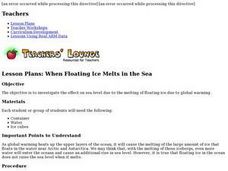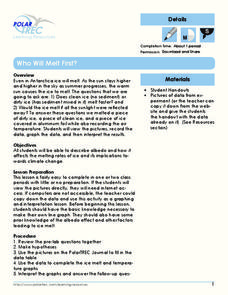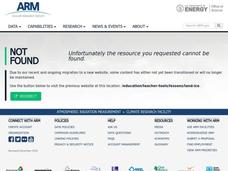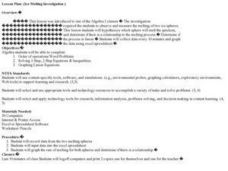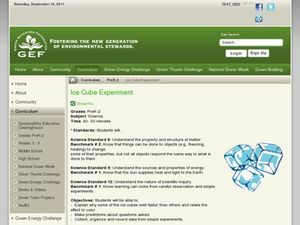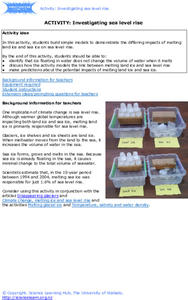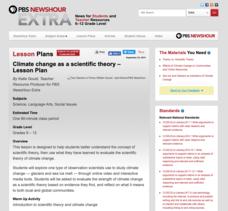Curated OER
Scientific Method Experiment: Factors Affecting How Ice Melts
Students demonstrate the scientific method by conducting an ice cube melting experiment. They make predictions and observations, and conclude what factors make ice melt more slowly or quickly than normal.
Curated OER
When Floating Ice Melts in the Sea
With this simple inquiry exercise young scientists observe the effects of melting ice on water level. Set up an easy experiment with floating ice cubes in a dish of water then have your pupils make and record their observations of the...
Curated OER
Melting the Ice: Energy Transfer
Students study thermal energy and energy transfer to sea ice processes. In this energy transfer lesson, students make their own ice cream and discuss energy transfer and thermal energy. Students view a radiation overhead and its role in...
Nevada Outdoor School
Let It Snow! Let It Melt!
Winter weather offers a great opportunity to teach young scientists about the states of matter. This activity-based lesson includes a range of learning experiences, from experimenting with the rate at which ice melts...
Curated OER
Real Ice Ages Longer Than Movie Ice Ages
If your class's knowledge of the Ice Age is limited to animated movies, use this lesson plan to strengthen their knowledge. After sharing what they know about the Ice Age, young readers explore a news article seeking to dispel...
American Chemical Society
Changing State: Melting
Dry ice is extremely cold — it is -109.3°F or -78.5°C. Scholars observe and explain the molecular motion associated with melting. Then they design their own experiments to speed up the melting process. Finally, a teacher presents a...
Polar Trec
Who Will Melt First?
If the Greenland ice sheet melted, sea levels would rise by about 20 ft; if the Antarctic ice sheet melted, sea levels would rise by 200 ft. Scholars explore ice melting through the analysis of different ice samples, clean and dirty ice....
Curated OER
When Land Ice Melts
The Artctic and Antarctic Ice caps are the focus of this Earth science instructional activity. In reality, this is more of a demonstration than a instructional activity, but there is some rich discussion that happens before, during, and...
Curated OER
"I'm Melting!"
Third and fourth graders engage with a worksheet designed to help them differentiate between melting and dissolving. After reading an informative paragraph about the two actions, they consider four scenarios, and choose whether they...
Curated OER
Volcanoes!: The Dangers of Snow and Ice
Students observe a demonstration of how melting snow and ice can contribute to mudflows. They then observea list of continents with the number of snow and ice covered mountains on each continent and discuss. They then label a group of...
Curated OER
Dry Ice: Simply Sublime
A fascinating lesson plan on states of matter is here for your young scientists. Dry ice is used to challenge learners preconceived notions about how solids work. They discover all sorts of interesting facts about states of matter from...
Curated OER
Melting and Freezing Behavior
High schoolers investigate melting and freezing behavior in substances. In this melting and freezing points lesson plan, students perform experiments to test the impact of various salts on the freezing point of water, they test the...
Beyond Benign
The Big Melt: Arctic Ice Caps
Are the Arctic ice caps really melting out of existence? Junior climatologists examine the statistics of ice decline through four math-based lessons. Each activity incorporates data, climate information, and environmental impact into an...
DiscoverE
Ice Cream Special
We all scream for ice cream! Individuals create home-made ice cream in the classroom. This is a delicious way to show a real-world application of the freezing point depression to your class.
Aquarium of the Pacific
States of Matter: Making Ice Cream
Who knew that learning about the states of matter could taste so sweet? This fun hands-on lesson captures the attention of learners as they use what they know about solids, liquids, and gases to create their very own batch of ice cream.
Curated OER
Ice Melting Investigation
Young scholars conduct an ice melting investigation in which they observe and measure the melting of two ice spheres. They develop a hypothesis as to which sphere will melt the fastest, collect data every ten minutes, and graph the data...
Curated OER
Ice Cream Lab
I scream, you scream, we all scream for ice cream! Even high schoolers enjoy making ice cream. This laboratory exercise has them record the temperature changes throughout the process of liquid becoming solid, graph the results, and...
California Academy of Science
Global Climate Change and Sea Level Rise
Ice is nice, and its condition on the planet has a significant effect. Junior geoscientists experiment with ice melting in both water and on land to discover how each affect the rising sea level. This detailed lesson outline even...
Curated OER
Changing Planet: Melting Glaciers
Resource links to a video, satellite images, data, and photographs of glaciers provide emerging earth scientists the opportunity to examine how the ice has been retreating over the years. A data table is included for pupils to record...
Curated OER
Ice Cube Experiment
Students explore the rate at which ice melts. In this science lesson plan, students place ice cubes on colored index cards and place them in direct sunlight. Students observe which ice cubes melt fastest and slowest.
University of Waikato
Investigating Sea Level Rise
Find an explanation for the sea level rise. Pupils investigate the difference that melting land ice and sea ice have on the sea level. Groups create two models—one with ice on land and one with ice in the water. As the ice melts, teams...
PBS
Climate Change as a Scientific Theory
Get your class thinking about climate change as a scientific theory. Guided by a handout, emerging earth scientists read articles and take notes about glaciers and sea ice. To conclude, they write an evaluation of the evidence for...
Curated OER
Sea Ice and Sheet Ice Melting Experiment
Students observe the change in water level as a result of melting sea ice and melting sheet ice.
Curated OER
When Land Ice Melts
Students investigate what happens when land ice melts. They discuss how the melting of land ice is different than the melting of icebergs. Students observe what happens as the ice melts.
Other popular searches
- Ice Cube Melting Experiment
- Melting Ice
- Melting Ice Cubes
- Ice Melting Kindergarten
- Ice Melting Investigation
- Ice Melting and Freezing
- Ice Melting Point
- Science Lessons Melting Ice
- Science Ice Melting
- Polar Ice Caps Melting
- Ice Melting Data
- Rate of Ice Melting



